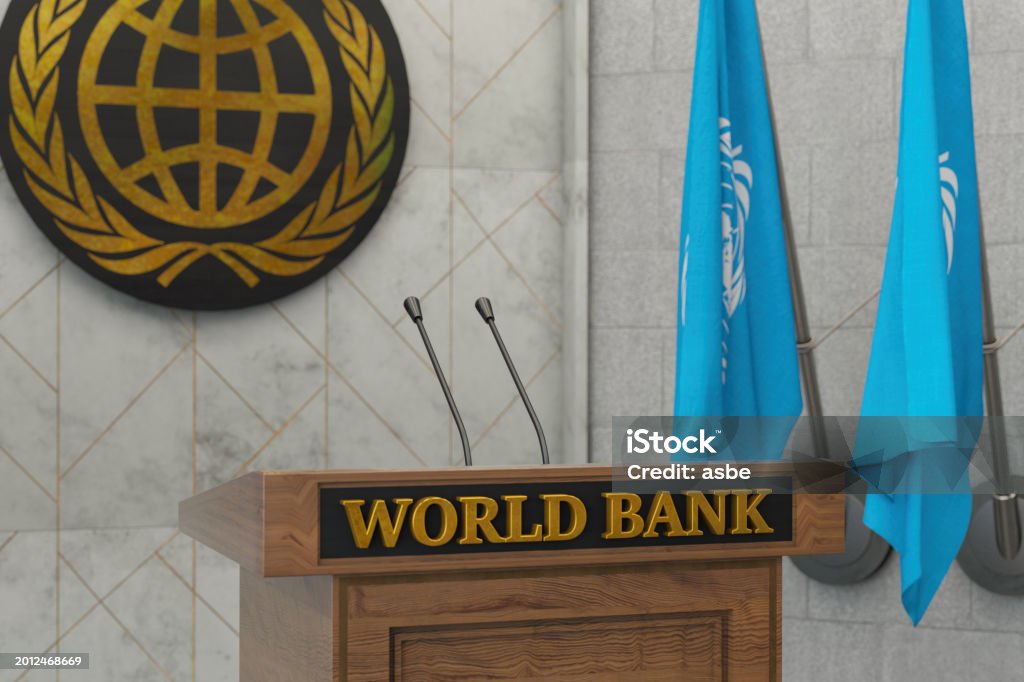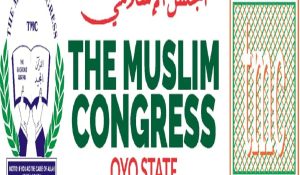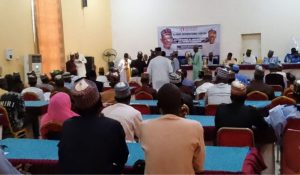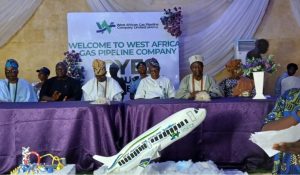
World Bank Press Conference or Speech Concept with Flags in a Row. . 3D Render
In the face of economic hardship, the World Bank has once again voiced strong support for President Bola Tinubu’s administration, commending its commitment to implementing policy reforms modeled largely on the recommendations of the World Bank and the International Monetary Fund (IMF).
At the recent launch of the Nigerian Development Update (NDU) in Abuja, World Bank’s Country Director for Nigeria, Ndiame Diop, expressed confidence that these reforms are leading Nigeria towards “long-term stability,” calling for Nigerians’ continued support for the administration’s efforts.
While the World Bank’s endorsement may be welcome news in certain circles, it has stirred criticism and frustration among Nigerians who find themselves grappling with soaring inflation, high costs of living, and escalating poverty. The question arises: Can policies shaped by international institutions truly serve the interests of ordinary Nigerians, or do they prioritize fiscal restructuring at the expense of human well-being?
Truth is, President Tinubu’s commitment to reform began early, with his administration quickly announcing the removal of petrol subsidies and the merging of official and parallel market foreign exchange rates. Later, in line with World Bank recommendations, the government proceeded with removing the subsidy on electricity, a move that has since raised energy costs for households and businesses alike. In June, the World Bank sponsored an article lauding these steps, calling them “macro-fiscal and governance reforms” that could, if sustained, help transform Nigeria’s economic landscape.
The World Bank’s optimistic outlook comes with substantial support. Recently, it pledged $15 billion in “technical advisory and financing” to assist Nigeria’s transition. Of this, $2.25 billion has already been approved, with $1.5 billion released for “development policy financing.” Such backing underscores the extent to which the World Bank is invested in seeing these reforms through to success.
Despite the promises of long-term stability, many Nigerians are feeling the immediate, severe effects of these changes. Inflation in Nigeria is currently at historic highs, reaching over 26% in recent months, and everyday goods are increasingly unaffordable for the average Nigerian. According to the National Bureau of Statistics (NBS), nearly half of Nigeria’s population now lives below the poverty line, with millions facing food insecurity and an overall decline in living standards.
CSR REPORTERS recalls that this rise in poverty and inequality has come at a time when many hoped for economic relief. The removal of fuel subsidies, intended to eliminate corrupt practices and save funds, has instead doubled transportation costs, while the floating of the naira has weakened purchasing power further. Local businesses are struggling, with many closing down, and multinational companies are increasingly looking to exit Nigeria, citing unsustainable operating costs and unfavorable economic conditions.
The government’s promise of investments in public goods, such as affordable rice and Compressed Natural Gas (CNG) buses, has yet to materialize meaningfully. Although the administration assured Nigerians of food price relief and transport options to ease the effects of fuel subsidy removal, implementation has lagged. Meanwhile, a much-touted student loan scheme has been suspended indefinitely, leaving many questioning the government’s commitment to the public welfare initiatives it promised.
The current economic realities presents a significant opportunity for corporate social responsibility (CSR) and sustainable development. The private sector, particularly large corporations, could play a more active role in providing relief to struggling communities. For example, CSR programs could focus on food assistance, support for local farmers, and capacity-building initiatives to empower Nigerians economically.
Additionally, sustainable practices—such as investments in renewable energy and locally sourced agricultural projects—could reduce dependence on imports and promote a resilient local economy. By collaborating with government agencies and NGOs, private companies can contribute to Nigeria’s long-term growth and stability. Initiatives that prioritize job creation, skill development, and climate resilience are crucial as Nigeria looks to build a more sustainable economic model that serves its citizens first and foremost.
One of the biggest criticisms facing the Tinubu administration is that it seems more attuned to international applause than to the voices of its citizens. President Tinubu has publicly highlighted achievements aligned with the World Bank’s agenda, but critics argue that his administration has yet to address pressing issues affecting everyday Nigerians.
While reforms are necessary for economic stability, they must be balanced with the well-being of citizens. Protests against rising costs and economic hardship have been met with force, with security agencies arresting demonstrators and even charging some with treason. This heavy-handed approach signals a growing divide between Nigeria’s political leadership and the people they were elected to serve. For lasting stability, the government must engage directly with Nigerians, focusing on policies that balance reform with immediate relief.
It has therefore become more than crucial that policymakers take a holistic approach that prioritizes both macroeconomic stability and the welfare of citizens. The government could consider phased, gradual reforms to lessen the immediate impact on the most vulnerable, alongside social safety nets designed to provide real, tangible support.
Furthermore, ongoing transparency and accountability will be key in sustaining public trust. Nigerians deserve to see where and how promised funds are being allocated, particularly with international loans and investments being funneled into the economy. Enhanced communication from leaders on the tangible benefits of these reforms will go a long way in fostering public support.
Ultimately, while international institutions may champion Nigeria’s progress, it is the applause of Nigerians—the individuals who experience these changes daily—that should be the government’s true measure of success. Addressing the challenges of today with empathy, responsiveness, and a commitment to inclusive, sustainable growth will set Nigeria on a more balanced path toward the economic prosperity it aspires to achieve.









